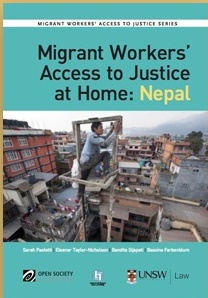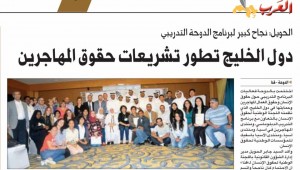 From 23-25 November 2011, Migrant Forum in Asia and local organizing partner, Human Rights and Development Foundation in partnership with Open Society Foundations (OSF), hosted Lawyers Beyond Borders: Building Partnerships for Justice for Migrant Workers in Bangkok, Thailand. The conference was the first of its kind, bringing together 31 lawyers from the Middle East, South Asia, and Southeast Asia who specialize in cases involving migrant workers. In addition to the lawyers were civil society activists in the area of migrants’ rights and observers from OSF.
From 23-25 November 2011, Migrant Forum in Asia and local organizing partner, Human Rights and Development Foundation in partnership with Open Society Foundations (OSF), hosted Lawyers Beyond Borders: Building Partnerships for Justice for Migrant Workers in Bangkok, Thailand. The conference was the first of its kind, bringing together 31 lawyers from the Middle East, South Asia, and Southeast Asia who specialize in cases involving migrant workers. In addition to the lawyers were civil society activists in the area of migrants’ rights and observers from OSF.
This convening of lawyers was the result of four years of thinking and strategizing by MFA and its various partners, including Center for Migrant Advocacy (CMA), the International Labour Organization (ILO), the UN Migrant Workers Committee, and individual lawyers throughout Asia. It was designed in response to the recognized need for collaboration among lawyers who work on the cases of migrant workers in order to move towards impact litigation and policy advocacy in their work. This program was also looked at as a means of beginning to forge important connections between lawyers and grassroots organizations working with migrant workers on the ground, as well as migrant communities in both countries of origin and destination.
An action plan was drawn up collaboratively on the final day of the workshop. The plan includes a series of projects that will be undertaken collectively, including:
- drawing up plans for paralegal training sessions that will better connect civil society and foreign missions to the work of lawyers, and to help them to assist migrant worker communities with their legal needs;
- compiling resources that will be of use to lawyers, migrant worker advocates, and migrant communities; supporting advocacy campaigns (e.g. the ratification of ILO Convention 189 on Decent Work for Domestic Workers);
- supporting one another through effective networking and information sharing



